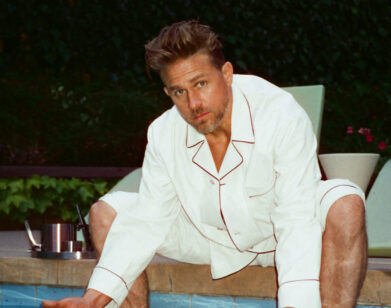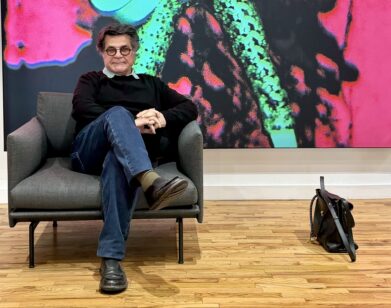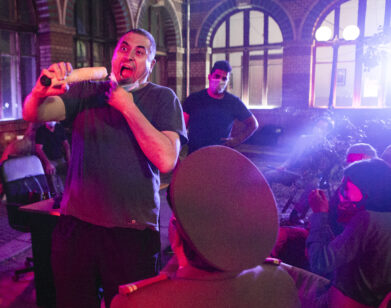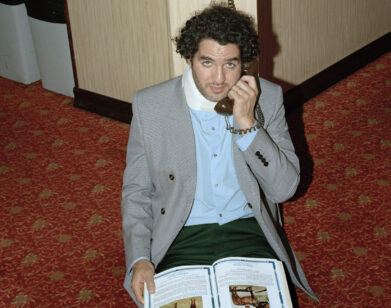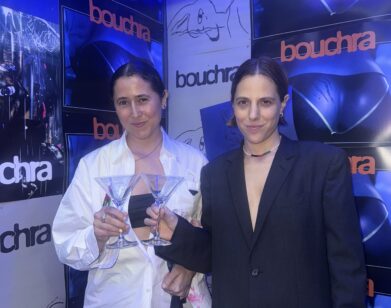The Marvels of Joseph Mawle
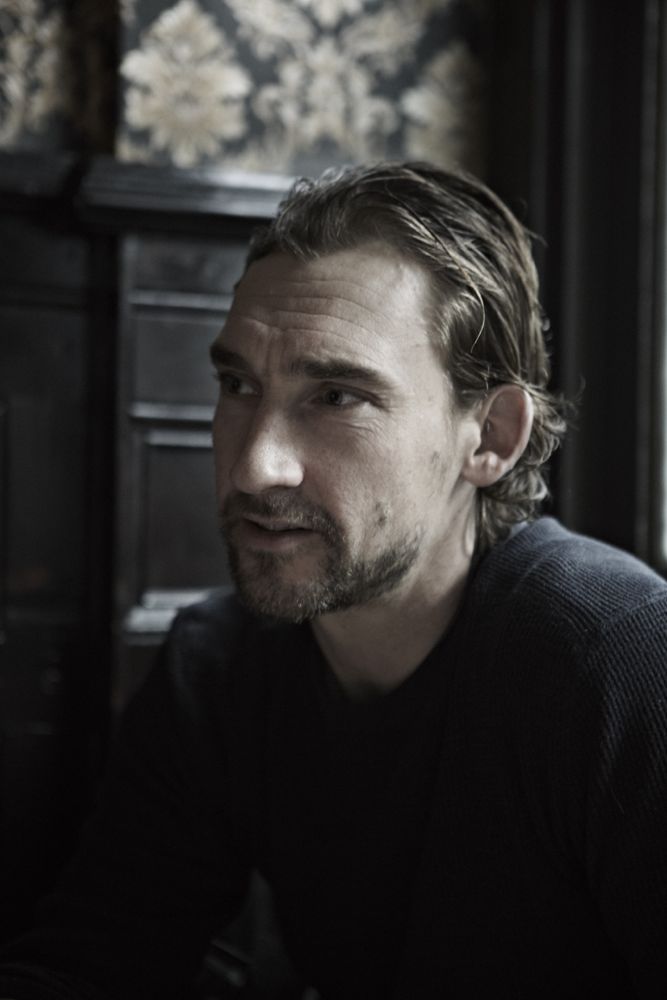
ABOVE: JOSEPH MAWLE. PHOTO COURTESY OF JOSS SHINNER.
Other actors might baulk at some of the roles offered to Joseph Mawle. Raised on a farm, Mawle lost most of his hearing at age 16, but it certainly hasn’t deterred him. Over the last five years alone, the British actor has portrayed a misogynistic murderer, (Red Riding: In the Year of Our Lord 1980), a skulking deserter (The Awakening), Abraham Lincoln’s father (Abraham Lincoln: Vampire Hunter), Sean Bean’s brother (Game of Thrones), and Jesus (in the mini-series The Passion). Mawle’s gumption has not gone unnoticed; this year, he earned a BAFTA nomination for his role opposite Eddie Redmayne in Birdsong, and was cast in the film adaptation of Half of a Yellow Sun opposite Thandie Newton and Chiwetel Ejiofodor.
This week, Mawle plays Sigourney Weaver‘s partner and a trained sniper in The Cold Light of Day. Interview caught the actor in Scotland to discuss sniping, farm-life, and how his hearing impairment has affected his acting career.
EMMA BROWN: So can you tell me a little bit about your role in The Cold Light of Day?
JOSEPH MAWLE: Well, I have to keep some of it secret, [laughs] it sort of kills the story [otherwise]. I’ll say that the film is very much about loyalties—loyalties to families and loyalties to partners. My loyalty is to my partner, who’s played by Sigourney Weaver. I’m there to make sure nothing happens to her. That’s my job. She’s a pretty important person in [my character’s] life at this point in time. He’s a drunk. He’s not the nicest of people and he has a bit of sadomasochism about him. He likes getting hurt —physically, not mentally.
BROWN: How did you get into the role?
MAWLE: I actually had to go into training which gives a bit of it away. I had some gun training with a guy who’s a four-time world champion sniper rifle targetsman.
BROWN: Oh, I didn’t know they had a world championship for sniping.
MAWLE: Yeah, it’s not actual sniping, more target shooting than taking out actual people.
BROWN: Yes, I would imagine so. Had you ever been shooting before?
MAWLE: Only clay pigeon shooting. I grew up on a farm, so there were rifles around. Every March around springtime, there’s a big hunt that goes on, and you go out and hunt down all the pheasants. I actually never shot the pheasants; I’m not a big fan of killing animals myself.
BROWN: That must have been pretty difficult stance to maintain growing up on a farm.
MAWLE: [laughs] Yes, possibly. There were some times when, as the farmer’s son, I had to take out some chickens. That could disturb one for life.
BROWN: How was working with Sigourney Weaver?
MAWLE: For want of a better expression, she’s a proper person. She’s so generous. We talked about this and that, and her experiences throughout her profession. There’s one scene on the roof and I like to get myself in a bit of a sweat, if it’s a scene that requires me to be out of breath I like to be out of breath and pumped, as it were. I was doing my stuff on the roof and Sigourney came up and grabbed my arm and we ended up doing a waltz on the roof before the scene. She said to me “Joe, relax. Just enjoy this, this is the fun bit.”
BROWN: Were you intimidated by her before you started filming?
MAWLE: The only time I was intimidated was the first time [I saw her] walking out of the hotel. I was coming back in from [from my run], and Sigourney—I’d not met her yet—she had her black glasses on and she was walking straight out of the hotel. At that point I thought, Oh gosh.
BROWN: Were you like, “Should I wave, should I not?”
MAWLE: Yeah. She looked really focused. She looked really dangerous; [so I decided] I’m going to stay out of the way. As it is, she’s one of the nicest people. So there was initial fear. But it was all deceit fear rather than real fear.
BROWN: Cold Light of Day was quite a big film. I know you’ve been in lots of smaller indie films, but is Abraham Lincoln the biggest budget film that you’ve done?
MAWLE: Yeah, I think Abraham Lincoln, Vampire Hunter—not the Spielberg one.
BROWN: What do you think the main differences are between making something like Made in Dagenham or Shell and making something like Abraham Lincoln, Vampire Hunter?
MAWLE: I guess the biggest thing would be time. When you’re making a film on a huge budget, you have a great deal more. There are a lot more names to remember [on a big-budget film]. That’s an important factor. If you want to get on with everybody, remember everybody’s name. I’m definitely going to take a pad with me next time I’m on a big film set and take down everyone’s name.
BROWN: You often play people with dubious morals; do you feel like you’re typecast?
MAWLE: No, I feel like I’ve been really lucky in that respect. I’m not sure if people know if I’m good or bad. But yes, I have played some quite despicable characters. Especially Peter Sutcliffe [known as “the Yorkshire Ripper”] who is famous for his killing of females back in the ’70s [in 2009’s Red Riding: The Year of Our Lord 1980]. But recently there was the beautiful story Birdsong, [and] the character in that is one of the simplest, kindest, and most open people I’ve ever played. He is pretty much there for everybody else but himself. So it’s nice to be able to jump around the ring and not get stuck in one corner. Luckily, playing the Yorkshire Ripper didn’t pin me down! Being a heterosexual single male, that would have been quite unfortunate.
BROWN: Did you always want to be an actor?
MAWLE: Not always. I think it was at about 14 years old that I started to get into it. I wasn’t the most academically gifted person while studying at school. [My first part] was in a play called Conquest of the South Pole. I remember that very distinctly. I lost my hearing when I was 16, [so] I had only recently become hearing impaired. My character had to stalk around the back of the stage throughout the show and howl once, which, when you’re hearing impaired, is petrifying. At the end of the play, he gets to hug the lead guy. And I remember very clearly being genuinely scared of being on stage, being genuinely scared of and really holding onto this lead guy, because I didn’t know how else to do it. And people said “That was really good what you did up there. You’ve really got something.” I thought I was awful. ‘Cause I was just being me, on stage. I think that was my first lesson in how to act, I guess.
BROWN: Has being hearing impaired ever been a problem for you in terms of acting?
MAWLE: I think it’s probably been a help. Partly because people are saying “No, no, don’t do it!” There is an element where it has been very useful—90 percent of our communication is through body language. The amount of hearing I had, and the fact that my eyes are very sharp, means I can combine the two.
BROWN: You played Jesus once, right?
MAWLE: I did.
BROWN: How was that?
MAWLE: Not easy. [laughs] Obviously most of the western world has an image of Jesus in their minds, [and] I’m pretty sure I don’t fit that many. You always know if you take on that role, you’re going to disappoint a lot of people in the process. I did my best. The crucifixion was very real. We were in a Moroccan deserted landscape, with two crosses. We dislocated arms, we were burned. After two days I lost feeling in my right arm for about three weeks after, it just had no feeling.
BROWN: That sounds horrible!
MAWLE: Yeah, well they have this word excruciating, and excruciating comes directly from crucifixion. Hence, yes, it’s quite painful. Even being a perfectly healthy person stuck up in that position is not the most comfortable.
BROWN: You seem to play quite a few controversial people.
MAWLE: Exactly. I think it’s okay to explore.
BROWN: Have you ever gone too far in your research and felt completely enmeshed in a negative way in your character?
MAWLE: That’s a dangerous question, but a really brilliant one. I think one never knows. Yes there are times when depression has hit after finishing a job. Whether that’s the come down from the job, quite often living in a hyper real state. I think it can affect you, and you have to be mindful of that and accepting of that. It’s only happened once or twice, not every time. It does depend on what the role is asking of you and how far you decide to take that particularly challenging role.
BROWN: Is there anything you do to take yourself out of it when you feel like it’s getting too much?
MAWLE: Run. [laughs]. Go for a run or stick in the iPod. Listen to Johnny Cash. He’s always good. So is Bruce Springsteen, I’ve always got him. Music is definitely a good way out. And a quiet drink in a pub. That’s always good too.
THE COLD LIGHT OF DAY OPENS FRIDAY, SEPTEMBER 7.

